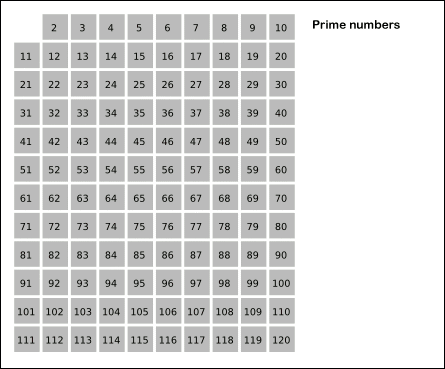Finding prime numbers with the Sieve of Eratosthenes (Originally: Is there a better way to prepare this array?)
Note: Version 2, below, uses the Sieve of Eratosthenes. There are several answers that helped with what I originally asked. I have chosen the Sieve of Era
-
Not sure if this will suite your situation but you can take a look at my approach. I used mine using Sieve of Eratosthenes.
public static List<Integer> sieves(int n) { Map<Integer,Boolean> numbers = new LinkedHashMap<>(); List<Integer> primes = new ArrayList<>(); //First generate a list of integers from 2 to 30 for(int i=2; i<n;i++){ numbers.put(i,true); } for(int i : numbers.keySet()){ /** * The first number in the list is 2; cross out every 2nd number in the list after 2 by * counting up from 2 in increments of 2 (these will be all the multiples of 2 in the list): * * The next number in the list after 2 is 3; cross out every 3rd number in the list after 3 by * counting up from 3 in increments of 3 (these will be all the multiples of 3 in the list): * The next number not yet crossed out in the list after 5 is 7; the next step would be to cross out every * 7th number in the list after 7, but they are all already crossed out at this point, * as these numbers (14, 21, 28) are also multiples of smaller primes because 7 × 7 is greater than 30. * The numbers not crossed out at this point in the list are all the prime numbers below 30: */ if(numbers.get(i)){ for(int j = i+i; j<n; j+=i) { numbers.put(j,false); } } } for(int i : numbers.keySet()){ for(int j = i+i; j<n && numbers.get(i); j+=i) { numbers.put(j,false); } } for(int i : numbers.keySet()){ if(numbers.get(i)) { primes.add(i); } } return primes; }Added comment for each steps that has been illustrated in wikipedia
讨论(0) -
Algo using Sieve of Eratosthenes
public static List<Integer> findPrimes(int limit) { List<Integer> list = new ArrayList<>(); boolean [] isComposite = new boolean [limit + 1]; // limit + 1 because we won't use '0'th index of the array isComposite[1] = true; // Mark all composite numbers for (int i = 2; i <= limit; i++) { if (!isComposite[i]) { // 'i' is a prime number list.add(i); int multiple = 2; while (i * multiple <= limit) { isComposite [i * multiple] = true; multiple++; } } } return list; }Image depicting the above algo (Grey color cells represent prime number. Since we consider all numbers as prime numbers intially, the whole is grid is grey initially.)

Image Source: WikiMedia
讨论(0) -
I have done using HashMap and found it very simple
import java.util.HashMap; import java.util.Map; /*Using Algorithms such as sieve of Eratosthanas */ public class PrimeNumber { public static void main(String[] args) { int prime = 15; HashMap<Integer, Integer> hashMap = new HashMap<Integer, Integer>(); hashMap.put(0, 0); hashMap.put(1, 0); for (int i = 2; i <= prime; i++) { hashMap.put(i, 1);// Assuming all numbers are prime } printPrimeNumberEratoshanas(hashMap, prime); } private static void printPrimeNumberEratoshanas(HashMap<Integer, Integer> hashMap, int prime) { System.out.println("Printing prime numbers upto" + prime + "....."); for (Map.Entry<Integer, Integer> entry : hashMap.entrySet()) { if (entry.getValue().equals(1)) { System.out.println(entry.getKey()); for (int j = entry.getKey(); j < prime; j++) { for (int k = j; k * j <= prime; k++) { hashMap.put(j * k, 0); } } } } } }Think this is effective
讨论(0) -
As Paul Tomblin points out, there are better algorithms.
But keeping with what you have, and assuming an object per result is too big:
You are only ever appending to the array. So, use a relatively small int[] array. When it's full use append it to a List and create a replacement. At the end copy it into a correctly sized array.
Alternatively, guess the size of the int[] array. If it is too small, replace by an int[] with a size a fraction larger than the current array size. The performance overhead of this will remain proportional to the size. (This was discussed briefly in a recent stackoverflow podcast.)
讨论(0) -
public static void primes(int n) { boolean[] lista = new boolean[n+1]; for (int i=2;i<lista.length;i++) { if (lista[i]==false) { System.out.print(i + " "); } for (int j=i+i;j<lista.length;j+=i) { lista[j]=true; } } }讨论(0) -
Your method of finding primes, by comparing every single element of the array with every possible factor is hideously inefficient. You can improve it immensely by doing a Sieve of Eratosthenes over the entire array at once. Besides doing far fewer comparisons, it also uses addition rather than division. Division is way slower.
讨论(0)
- 热议问题

 加载中...
加载中...